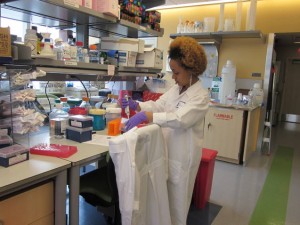“In Their Own Words” is an ongoing series featuring the experiences of Middlebury students at their summer internships. This summer Lelise Getu ’13 interned doing Immunology Research at the NYU School of Medicine in New York City.
What did you do?
I interned full time as a research assistant with the B-Cell Immunology Laboratory at Alexandria center for life sciences for NYU School of Medicine. During my nine weeks stay at Silverman’s laboratory, I worked on three main research projects related to Rheumatoid Arthritis (RA) patients. My first research project aimed to reason out the causes for the increased rate of cardiovascular disease in Rheumatoid Arthritis patients when compared to healthy controls (a person without RA). I used a common biological methodology called Elisa (Enzyme linked immunosorbent assay) to analyze the patient’s blood samples in order to deduce different hypothesis. This methodology can be very hectic and time consuming if one wants to test different hypothesis at the same time. Hence, my second project mainly focused on developing a standard Luminex (LumAvidin) protocol that helps to test all hypotheses at the same time. My third research project on the other hand focused on finding the etiology (cause) of RA in relation to proteins called citrullinated peptides.
This internship experience showed me how significant science is in solving real life problems. Through this internship experience, I have developed excellent organizational skills, including the ability to multi-task and prioritize efficiently; ability to work independently on assigned projects; excellent understanding of statistical calculations involved in data analysis: strong analytical, problem solving, organizational, and presentation skills. I also met and networked with renowned health care professionals through different lectures and journal clubs that consequently helped me to expand my knowledge on immunology and microbiology. The most exciting part of the internship was working with real RA patient’s blood sample. These brought the significance of school work to solving real life problems.
What are your plans for the future?
The research experience has made me rethink my post-graduate plans. At the moment, I am doing pre-requisites for pharmacy schools. However, from last summer internship experience I found pharmacy not that challenging. I liked the challenge and the learning process involved in doing research. Hence, upon graduation I plan to take a year off to do research and then most probably make my doctor of pharmacy degree research focused by doing PharmD/PHD.
Think this experience sounded pretty cool? Check out opportunities like this and more on MOJO.
